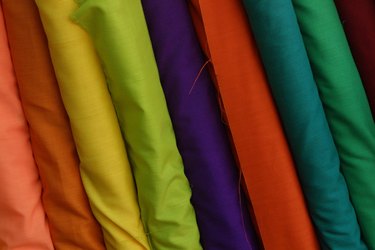Things You'll Need
Fabric samples
Measuring tape or ruler
Pinking shears
Card stock, 110 pound weight or higher
Glue stick or paste
Hole punch
Metal book rings
Labels
Inkjet printer or pen

A fabric sample book is used by designers and sewing enthusiasts on a regular basis. The book shows off several different fabric samples and is small enough to fit in a purse or briefcase. Interior and fashion designers can use the fabric sample books to find the perfect fabric for a room or garment. Sewing enthusiasts will use fabric sample books to pick fabrics for new projects and choose different patterns and styles of fabric for future items. You can create your own fabric sample book using either purchased fabrics or your own designs.
Step 1
Lay out your fabric on a flat surface. Measure 3 inches by 5 inches on one piece of fabric with your ruler or measuring tape.
Video of the Day
Step 2
Cut out the fabric rectangle you just measured using pinking shears. These special scissors will produce a zigzag pattern on the fabric's edge that stops fraying.
Step 3
Cut the remaining fabric samples into 3-inch by 5-inch rectangles using your pinking shears. Count the number of fabric rectangles you have.
Step 4
Cut 3-inch by 5-inch rectangles out of the card stock, also using your pinking shears. You will need an equal number of card stock rectangles and fabric rectangles.
Step 5
Turn the fabric rectangles over so the good side of the fabric is facing down on a flat surface.
Step 6
Cover one side of a card stock rectangle with glue from a glue stick or paste. Make sure the glue or paste is evenly spread on the card stock.
Step 7
Place the glue side of the card stock rectangle on the backside of a fabric rectangle. Apply gentle pressure to the back of the card stock rectangle and set aside. Continue to attach the remaining card stock rectangles to the fabric rectangles. Allow the samples to dry completely.
Step 8
Punch a hole in the upper left corner of each sample, 1/2 inch from the edge, using a hole punch. Each hole should be placed in the same location on each sample.
Step 9
Thread each sample on the metal book ring. Once all of the samples are on the ring, close the ring.
Step 10
Place address size labels on the back of sample, if you desire. You can either write the name and price of the fabric on the label with a pen or print the information on the label using an inkjet printer. If you choose to print the information, do that before placing the label on the fabric sample. Also include the fabric manufacturer so you will know how to find the fabric should you decide to use it.
Tip
If you are buying fabric for your sample book, inquire about scraps or pieces on the end of the roll. These are usually small pieces that might not sell, but are perfect for a sample book and you should be able to buy them at a discount. Include your name and contact information on the fabric sample book if you will be loaning it out to others. Placing the card stock on the back of the paper makes it stronger, which is needed for the sample book.
Video of the Day